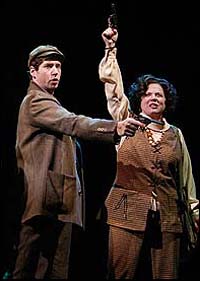
*
For seven years, since it debuted Off-Broadway at the Vineyard Theatre, the musical Avenue Q made sport of the woes of former child actor Gary Coleman. Not only did the creators of the musical make the "Diff'rent Strokes" star a character on the fictional, "Sesame Street"-like thoroughfare, they made him everyone's superintendent. And they had Coleman played by a woman in male clothes. "I'm Gary Coleman, from TV's 'Different Strokes," sang the character in introduction, during the song "It Sucks to Be Me." "Made a lot of money that got stolen by my folks/Now I'm broke and I'm the butt of everyone's jokes." The other characters responded that, yes, it did indeed suck to be him more than it did to be anyone else.
The sequence was comedy dynamite. The audience roared every night. Until May 28, when the news broke that Gary Coleman had died at the age 42. While making fun of the actor's career misfortunes was acceptable while Coleman was alive, when the actor passed such jibes suddenly seemed in poor taste.
The show responded immediately with a series of actions. A May 28 statement released by the show read, "The creators, producers, and company of Avenue Q are terribly saddened to hear of the death of Gary Coleman, whose tremendous gifts brought delight and inspiration to audiences around the world. While everything in life may be only for now, we suspect that Gary's legacy will live on for many years to come. Gary's memory will certainly endure in the hearts and minds of those of us who live on Avenue Q." That evening, actress Danielle K. Thomas, who currently portrays Coleman in the musical at New World Stages, paid a tribute to him from the stage.
A few days later, it was announced that selected lines from the show involving Coleman would be altered. "I was on alert," said composer-lyricist Bobby Lopez. "[Librettist] Jeff Whitty had called me and said Gary was in the hospital. And we sort of knew there might have to be changes." Lopez called the producers and discussed the matter. They didn't know how the show would be affected. "In the end, we changed very little. All the songs were kind of fine as they were. There were just a couple lines that seemed to be in the wrong spirit, given his death."
When putting together a show, there are certain factors for which producers and creators can reasonably prepare. Workshops, readings and previews help to gauge audience reaction, problems in the script, and potential design difficulties. Heads are put together to determine the right theatre to book, the right time to open, the appropriate budget, and the correct marketing avenues. But you can't prepare for the reality of breaking news. Every now and then, that old devil "current events" throws a monkey wrench into the smoothest production, leaving the creators scrambling to set the machinery aright. Another production arguably thrown a curve ball by the fates this season was Enron. The Lucy Prebble play about the duplicitous American corporation was a hit in London, and producers expected it to perform well on Broadway, too. Many thought it would be the play to beat during the Broadway spring season.
| |
 |
|
| Enron's Norbert Leo Butz | ||
| photo by Joan Marcus |
However, Time Out New York critic David Cote doesn't necessarily think bad timing was the only reason Enron flopped. "There were several reasons why Enron failed in its commercial Broadway run, but reality wasn't the main one," he said. "I find it amusing that critics and pundits tried to argue that the average ticket buyer already knew all about Enron, Madoff, Goldman Sachs and the like and so they learned nothing new at Enron, the play. That's bunk. How many Broadway audience members watch docs such as 'The Smartest Guys in the Room' or Congressional hearings involving Goldman Sachs? Not that many, I'd imagine. Anyway, Enron was more than a lesson in economics, not that most critics could see that. Basically the show should never have tried to compete in the marketplace; it should have had a limited nonprofit run at Studio 54, Circle in the Square or St Ann's Warehouse."
Theatre history is riddled with examples of bad timing. Cole Porter's 1934 musical comedy Anything Goes — set on a transatlantic luxury liner — was originally to have focused on a shipwreck, but that plot was scrapped when the S.S. Morro Castle burned off the coast of New Jersey, killing more than 130. In 1941, a new play called The Admiral Had a Wife, a comedy set at a naval base in Hawaii, was set to open on Broadway. On Dec. 7. After the Japanese attacked Pearl Harbor, the play was withdrawn.
Perhaps no show has suffered from the slings and arrows of outrageous fortune that Stephen Sondheim's edgy musical Assassins. A show built around discontents that took shots at American Presidents, the material was provocative to begin with. Still, during December 1990 and January 1991, when the orignal production debuted at Playwrights Horizons, there were hopes it would transfer to Broadway. Then, on Jan. 17, 1991, America launched Operation Desert Storm to push Iraqi forces out of Kuwait, in the first Gulf War. With American soldiers fighting overseas, and patriotism in full bloom at home, a musical about John Wilkes Booth and company seemed out of tune. Broadway plans were scrapped.
| |
 |
|
| James Barbour and Becky Ann Baker in Assassins | ||
| photo by Joan Marcus |
Assassins finally got its day in the Broadway sun in March 2004, at Studio 54. The production was praised and won five Tony Awards including Best Revival of a Musical. Some thought the production had legs and that it might get extended into the fall. It so happened that the Republican National Convention was planned for August 2004 in Manhattan, which might have presented another conflict with current events: Would Assassins, 20 blocks from the convention, be in good taste? As it turned out, Roundabout's production closed July 18 at the end of its scheduled limited run.
In the mid 1980s, the Jerry Herman-Harvey Fierstein musical La Cage aux Folles, about the unorthodox life of a middle-aged gay couple who run a nightclub on the French Riviera, was chugging along full steam. It won the Tony as Best Musical of 1984. When the growing AIDS crisis began making headlines, however, attendance starting falling off.
"The show was definitely affected by what was in the headlines," said Shirley Herz, who was the press agent on the show. "I remember the day Rock Hudson died and the TV cameras were outside the theatre interviewing people as they came out. At that point, there wasn't the awareness and understanding. People thought they could catch it over the footlights." The production ran for four years and 1,761 performances, closing on Nov. 15, 1987. But Herz believes it could have run for quite a while longer.
As for Avenue Q, Lopez says the current changes in the script will remain permanent, and the he does not expect the show to suffer. But, with Coleman gone, will the show now have to be set in the past? "That's a good question," said Lopez.
(Robert Simonson is Playbill.com's senior correspondent. He joined the website in 1998, was its editor from 1999 to 2006, and writes the weekly column Theatre Week in Review. His most recent book, "The Gentleman Press Agent," was released by Applause Books in May. Contact him at [email protected].)










